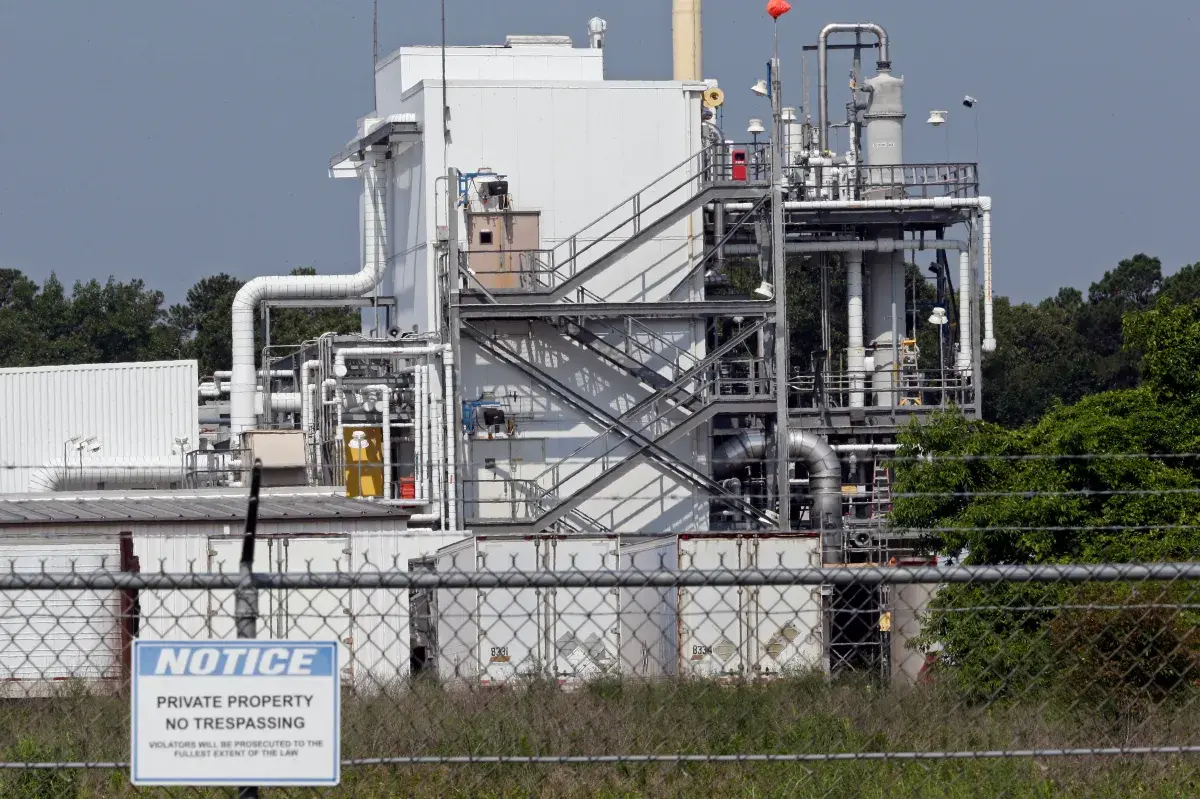Copyright Newsweek

A North Carolina City Council voted unanimously against a chemical company's request to expand its production at a Fayetteville plant over fears that it will result in further contamination of the area's drinking water supply. In its resolution last week, the Wilmington City Council wrote that Chemours' plant in Fayetteville has "a documented history" of releasing harmful per- and polyfluoroalkyl substances (PFAS) chemicals into the Cape Fear River and surrounding environment. Wilmington Councilmember Salette Andrews told Newsweek the council's decision "reflects our deep concern about the ongoing contamination of the Cape Fear River and the risks posed by PFAS chemicals to the health of our residents." Chemours told Newsweek in a statement that it respects the council's "right to express their opinion, though it seems counterintuitive to oppose a permit application that would ultimately reduce Fayetteville Works’ site-wide PFAS air emissions by 15 percent, despite an increase in production." Newsweek has contacted Wilmington Mayor Bill Saffo via email for comment. Why It Matters PFAS chemicals are a group of thousands of different substances that are classified as a Group 1 carcinogen by the International Agency for Research on Cancer. These chemicals are used across various industries, featuring in consumer products and even smartwatch wristbands, as they are favored for their long-lasting nature, but are now frequently found in U.S. drinking water systems. This is of serious concern to health and environmental experts, as vast amounts of research has unveiled the potential health risks associated with these chemicals—increased risk of various cancers alongside hormonal and reproductive issues. What To Know Chemours, which is known for its anti-stick chemical product Teflon, had requested to expand its production in Fayetteville, but the Wilmington City Council refused its request on Wednesday, urging the company to engage in "meaningful dialogue with affected communities" and prioritize locals' health and safety instead of "corporate expansion." According to the council's resolution, Chemours and its predecessor DuPont have previously contaminated the drinking water supply serving 500,000 residents by releasing PFAS chemicals into the Cape Fear River causing "public health concerns, environmental degradation, and economic burdens on local governments and residents who have had to invest in costly water treatment upgrades and health monitoring." The council also wrote that Chemours has also underreported its PFAS emissions and violated its air permit and the 2019 Consent Order. The council added that airborne PFAS emissions from the plant have polluted more than 11,000 private drinking water wells across 10 counties. This has resulted in PFAS levels in the water sources becoming thousands of times higher than the federal drinking water limits, posing notable harm to public health. The council wrote that Chemours has applied for an air permit to expand its operations as well as a Clean Water Act discharge permit, adding that its expansion "risks increasing PFAS emissions and further jeopardizing the health and safety of North Carolina families." PFAS pollution is something very close to the heart of Andrews who shared that she lost her 22-year-old son to cancer, who was exposed to significant amounts of PFAS chemicals while stationed in Iraq when he was in the U.S. Army, local news station WECT reported. She said he was exposed to "the toxic burn pits and the firefighting chemicals, which are nothing but PFAS." Residents in southeastern North Carolina also have much higher levels of PFAS concentrations in their blood compared to the average American, Kemp Burdette with the Cape Fear River Watch told the station. What People Are Saying Wilmington Councilmember Salette Andrews told Newsweek: "For years, people in Wilmington and across the region have been unknowingly drinking and cooking with water contaminated by PFAS discharged from that plant. While it’s difficult to link individual illnesses directly to PFAS exposure, residents have reported elevated cancer rates, thyroid disorders, and developmental issues—conditions that are consistent with the known health risks of these compounds. Families have lost confidence in the safety of their tap water, and that loss of trust has its own lasting harm. At this point, Chemours should not be allowed to expand its operations until it can demonstrate, with transparency and independent verification, that it can operate without releasing PFAS into the environment. Protecting public health must come before corporate growth." She added: "We also need stronger state and federal regulation of PFAS. North Carolina must adopt enforceable limits for PFAS in drinking water and hold polluters financially responsible for cleanup, testing, and medical monitoring. The science is clear, and the public deserves action that matches the scale of the threat." Chemours told Newsweek in a statement: "The proposed expansion is specific to two existing Vinyl Ethers production units at the site. Vinyl Ethers are a foundational chemistry that are an essential building block for many critical chemistries manufactured at other Chemours’ plants. These chemistries all enable technologies, such as semiconductor chips, defense systems, more sustainable and higher performing batteries, aviation components, advanced electronics, fuel cells and more. As outlined in the revised permit application, additional abatement technology will be installed alongside each expansion and is projected to decrease the site’s overall fluorinated emissions by approximately 15 percent, despite an increase in production. " The company added it has "taken a broad and unprecedented set of actions, including investing over $400 million, to reduce PFAS discharges from its Fayetteville Works site in North Carolina. These actions include the installation of a thermal oxidizer, which destroys over 99.99 percent of PFAS air emissions directed to it, and a mile long underground barrier wall that works in conjunction with a groundwater extraction and treatment system to intercept, collect and treat legacy groundwater and surface water discharges from the site before they reach the Cape Fear River." What Happens Next? The council has not only opposed Chemours' expansion request, but also urged the North Carolina Department of Environmental Quality, the U.S. Environmental Protection Agency (EPA) and other regulatory bodies to deny any permits or approvals that would enable Chemours to expand its operations. When asked if she was hopeful the council's resolution could spark statewide change in the regulation of PFAS chemicals, Andrews said: "I am cautiously hopeful." "The growing public awareness, bipartisan concern, and recent federal steps by the EPA to designate PFAS as hazardous substances give me some optimism that meaningful reform is possible—but it will take continued public pressure and political will," she added.



